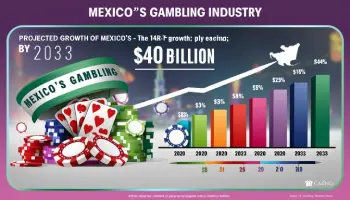Mexican Gambling Industry Set to Hit $40 Billion by 2033


Mexico’s gambling industry is on the cusp of a major boom that might see it quadruple by 2033. In a recent report, Astute Analytica reported that this market was worth $11.37 billion in 2024, and is expected to reach $40.64 billion by 2033, going by the current compound annual growth rate (CAGR) of 15.71%.
Thanks to this rapid growth, Mexico has become a heavyweight in the international betting scene and a country of interest globally. We will examine the factors contributing to the unprecedented growth, challenges they may run into, and what the future holds for Mexico.
A Perfect Storm of Growth Factors
Due to the country's cultural fervor for sports, tech developments and regulatory changes, Mexico’s gambling market is booming.
Mexicans have always had a taste for games of luck, including lotteries, soccer, and boxing. As observed, the digital age has supercharged these cultural affinities. Betting sites are increasingly gaining new users, owing to the growing internet use and the proliferation of smartphones. Younger, tech-savvy consumers are drawn to the convenience offered by gaming platforms as well as the rich variety of exciting games.
Regulatory changes are also paving the way. The Federal Gaming and Raffles Law was amended in the year 2021. The change resulted in an improved framework that encouraged investment by local and foreign operators. Gaming companies like Caliente and Spain’s CODERE are increasing their footprints in the country. At the same time, people are consuming more entertainment, including online gambling.
Online Gambling Takes the Lead
As expected, the online gambling sector is the star of the show. Studies show the online gambling market in Mexico will reach $2 billion by 2028, with the larger Latin American market hitting upwards of $12 billion the same year. An increase in mobile gaming apps is one of the main reasons for this growth. Weak regulations have also led to a considerable rise in offshore platforms.
Nevertheless, along with the upsides of the online boom, online risks like cybersecurity threats have also emerged. Pressure is mounting for industry operators to improve digital security to maintain consumer trust. Nonetheless, the ongoing developments might be huge boosts that will foster incredible experiences and a drop in latency for live betting, especially in esports.
Land-Based Casinos Face Headwinds
As more people get into online gambling, land-based casinos seem to be facing turbulence. According to a recent report by Covers, land-based casino revenue in Mexico dropped by 5% to $1.4bn in 2023 because people are increasingly choosing to gamble online. It is increasingly tougher for traditional operators to compete with online options as modernizing their facilities is simply too expensive.
Brick and mortar casinos still have a cultural dimension in tourist hotspots such as Cancun and Mexico City. Big gaming operators continue investing in integrated casino resorts to attract bigger spenders and tourists. Nonetheless, this does not dent the high demand for online gaming.
Regulatory and Social Challenges Loom
Even though Mexico’s gambling industry is growing, lots of challenges remain. To begin with, the country's regulatory framework is complex and full of loopholes.
Offshore platforms have been leveraging this to escape local licensing and tax requirements, creating an uneven playing field for regulated operators. As a result, illegal gambling is a major threat that robs revenue and limits consumer protection.
Social concerns also pose a threat. Some critics vehemently oppose the industry’s expansion, citing that it may lead to greater gambling addiction and debt problems. The government of Mexico is under pressure to control gambling advertisements and enact safer gambling policies. Many activists, for instance, want more control over loot boxes in online games.
Mexico is also vulnerable to money laundering operations. The country’s AML/CFT regime has major deficiencies. In 2018, the Financial Action Task Force (FATF) identified several faults, as reported in the mutual evaluation report and follow-up assessments. According to the FATF, these weaknesses suggest Mexico’s gambling sector might increasingly facilitate money laundering. To this effect, there is an urgent need for stricter regulation and robust enforcement.
Heralding a Bright but Cautious Future
Mexico’s gambling industry is at a pivotal moment. Over the next few years, the expected uptrend indicates the country has massive growth potential, driven by digital innovations, cultural enthusiasm for sports, and the liberal regulatory framework. Following the noticeable increase in mobile technology and youthful audiences, the online gambling sector will likely be the dominant force behind this expansion.
Yet, threats like cybercrime, gaps in the regulatory framework, and the likely adverse social effects cannot be ignored.
The Latin American nation is currently carving a space for itself on the global gambling map. It is showing similar trends to its fellow behemoth Brazil, which is also on a fast path after legalizing sports betting at the start of the year. While we cannot be sure about the future, it is evident that the gambling scene in Mexico is heating up, and the next 10 years might be full of surprises.
For more interesting news, you should read this article: Alberta Ready to Legalize Sports Betting and iGaming by 2026.
Was this article helpful?


